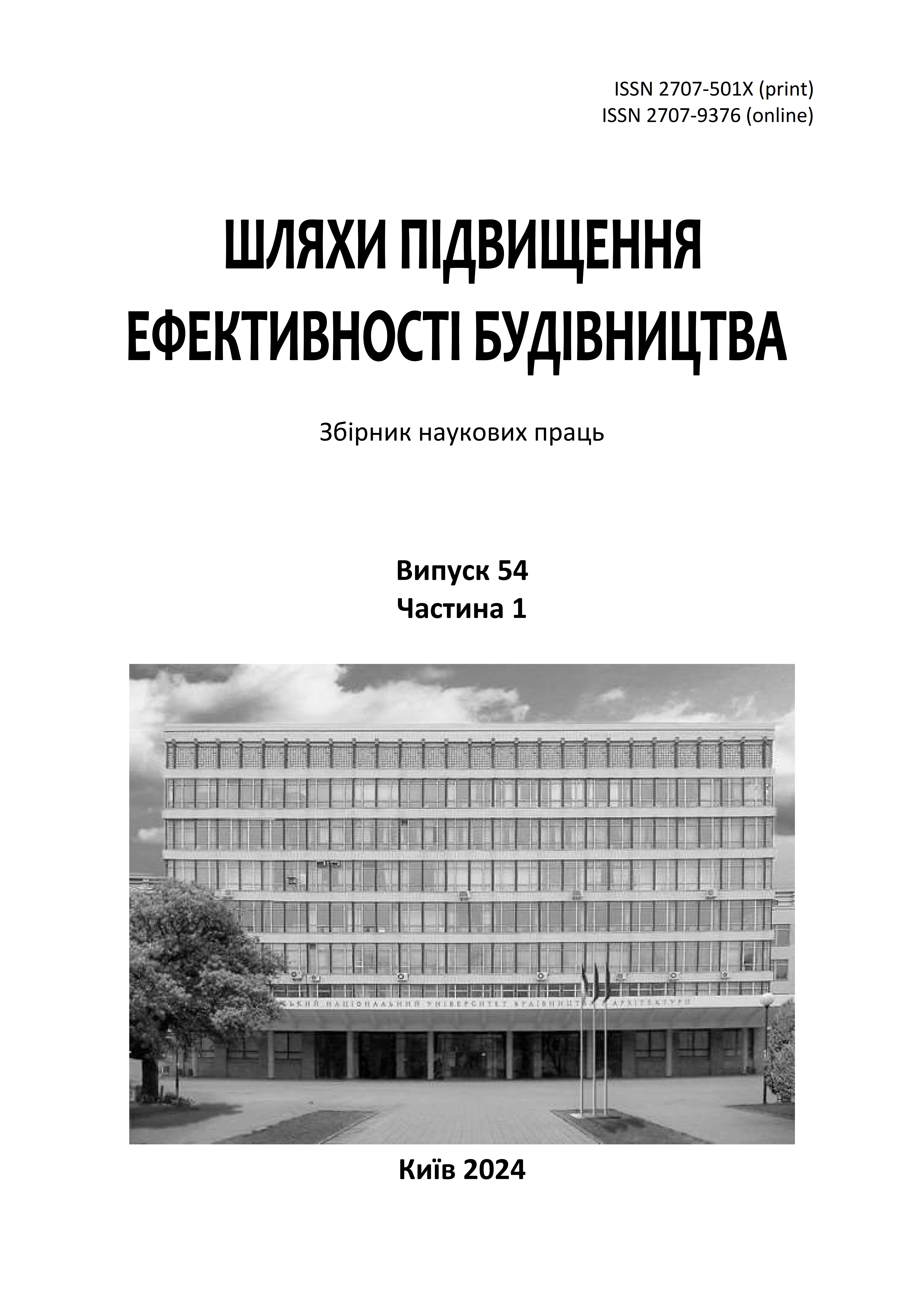Developer as an agent of innovative transformation of construction participants
DOI:
https://doi.org/10.32347/2707-501x.2024.54(1).199-210Keywords:
innovation, digitalization, sustainability, environmental friendliness, social responsibility, enterprises, developers, designers, contractors, suppliers, stakeholders, processes, products, marketing activities, organizational structures, transformations, innovations, constructionAbstract
Developers, who play a key role in financing, designing and implementing a project, play a key role in promoting innovation throughout the construction value chain. Researching the role of the developer as a catalyst for innovative development among construction participants and researching methods for assessing the innovative development of construction participants in accordance with the developer’s strategic requirements are relevant tasks of construction economics.Developers influence the innovation trajectory by setting performance benchmarks, ensuring compliance with state-of-the-art standards and facilitating collaboration between stakeholders, including architects, engineers, contractors and suppliers.The main focus of this study is the dual role of the developer as a demand generator and innovation driver. On the demand side, developers are setting clear innovation goals, driven by competitive pressures, regulatory requirements and market trends. On the supply side, they are driving innovation through investments in research and development, technology adoption and capacity building initiatives for construction stakeholders.To assess the impact of developers on the innovation development of construction stakeholders, the paper presents a comprehensive assessment framework. The assessment framework uses a combination of qualitative and quantitative methods, including surveys, performance audits and case studies. Specific criteria are established to measure how effectively developers are influencing innovation, with a focus on adaptability, scalability and long-term impact. Case studies of successful projects led by innovation-focused developers are presented to illustrate best practices and lessons learned. These examples highlight how developers can shape the ecosystem of construction stakeholders by aligning incentives, fostering a culture of experimentation and using their position to ensure compliance with industry standards.This study contributes to the understanding of the strategic importance of the developer in driving innovation in the construction industry and provides a practical roadmap for evaluating and promoting innovative methods aligned with the developer’s requirements. The results are expected to be useful for decision-making among developers, policymakers and industry practitioners, ultimately contributing to the development of a more sustainable and forward-looking construction sector.
References
Малюта Л.Я. Стратегічне управління інноваційним розвитком підприємства: навч. посібник. Тернопіль: ФОП Паляниця В.А., 2016. 232 с.
Радкевич А.В., Арутюнян І.А., Сайков Д.В. Оптимізація організаційних процесів будівельного виробництва як формотворча складова конкурентоспроможності підрядних підприємств. Шляхи підвищення ефективності будівництва в умовах формування ринкових відносин, 2018. № 35. С. 64 – 73.
Приходько Д.О., Дикий О.В., Малихіна О.М., Валінкевич Н.В., Іщенко Т.М., Савчук Т.В. Економіко-інституціональні аспекти формування портфеля девелопера: зміна парадигми й інноваційні рішення управління. Управління розвитком складних систем, 2021. № 47. С. 119 – 129. DOI: 10.32347/2412-9933.2021.47.119-129
Чорна М.В., Глухова С.В. Оцінка ефективності інноваційної діяльності підприємств: монографія. Харків: ХДУХТ, 2012. 210 с.
Зянько В.В., Єпіфанова І.Ю., Зянько В.В. Інноваційна діяльність підприємств та її фінансове забезпечення в умовах трансформаційних змін економіки України: монографія. Вінниця: ВНТУ, 2015. 168 с.
Ватченко О.Б., Ватченко Б.С., Черевко О.Л. Інноваційний розвиток підприємства: навч. посібн. Дніпро: Акцент ПП, 2017. 404 с..
Маркетинг. Менеджмент. Інновації: монографія / за ред. д.е.н., проф. С.М. Ілляшенка. Суми: Папірус, 2010. 621 с.
Згалат-Лозинська Л., Лич В. Актуальні проблеми стратегічного управлінського обліку витрат в системі інноваційного розвитку підприємств. Економіка та суспільство, 2022. (46). https://doi.org/10.32782/2524-0072/2022-46-72
Приходько Д.О., Жалдак Р.Ю., Дикий О.В., Валінкевич Н.В., Малихіна О.М., Іщенко Т.М. Процесно-структурні трансформації як пріоритетний вектор розвитку інноваційної платформи будівельного девелопмента. Управління розвитком складних систем, 2021. № 48. С. 114 – 124. DOI: 10.32347/2412- 9933.2021.48.114-124.
Христенко О.В., Боєв М.І. Управління впровадженням інноваційних технологій на будівельних підприємствах. Економіка і регіон, 2017. Вип. 6 (67). С. 118 – 124.
Федоренко В.Г., та ін. Інноваційні процеси в змішаній економіці: монографія у 2-х т. За ред. В.Г. Федоренка, Н.П. Денисенко. К.: Пік ДСЗУ, 2008. Т.1. 194 с.
Бєлєнкова О.Ю. Система методів управління розвитком будівельного підприємства. Економіка та держава. 2007. № 9. С. 38–42.
Зельцер Р.Я., Бєлєнкова О.Ю., Дубінін Д.В. Інноваційні моделі і методи організації, управління і економічної оцінки технологічних процесів будівельного виробництва: монографія. Київ: Леся, 2018. 208 с.
Захарченко Н.В. Перспективи розвитку дизайн мислення в управлінні бізнесом та інноваціями. Академічний огляд: Економіка та підприємництво. 2022. 1(56). С. 53–63.
Сорокіна Л.В. та ін. Економетричний інструментарій управління фінансовою безпекою будівельного підприємства: монографія / за наук. ред. Л.В. Сорокіної. Київ: КНУБА, 2017. 404 с.
Downloads
Published
How to Cite
Issue
Section
License

This work is licensed under a Creative Commons Attribution 4.0 International License.
Authors who publish with this journal agree to the following terms:
- Authors retain copyright and grant the journal right of first publication with the work simultaneously licensed under a Creative Commons Attribution License that allows others to share the work with an acknowledgement of the work's authorship and initial publication in this journal.
- Authors are able to enter into separate, additional contractual arrangements for the non-exclusive distribution of the journal's published version of the work (e.g., post it to an institutional repository or publish it in a book), with an acknowledgement of its initial publication in this journal.
- Authors are permitted and encouraged to post their work online (e.g., in institutional repositories or on their website) prior to and during the submission process, as it can lead to productive exchanges, as well as earlier and greater citation of published work (See The Effect of Open Access).

